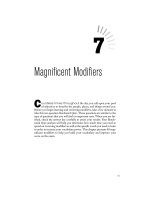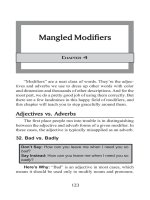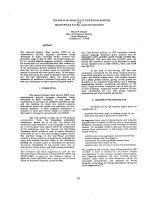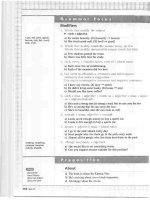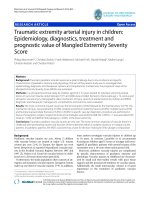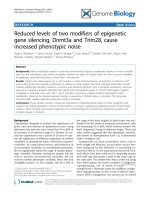Mangled Modifiers
Bạn đang xem bản rút gọn của tài liệu. Xem và tải ngay bản đầy đủ của tài liệu tại đây (471.37 KB, 20 trang )
123
Mangled Modifiers
C
HAPTER
4
Mangled Modifiers
123
“Modifiers” are a neat class of words. They’re the adjec-
tives and adverbs we use to dress up other words with color
and dimension and thousands of other descriptions. And for the
most part, we do a pretty good job of using them correctly. But
there are a few landmines in this happy field of modifiers, and
this chapter will teach you to step gracefully around them.
Adjectives vs. Adverbs
The first place people run into trouble is in distinguishing
between the adjective and adverb forms of a given modifier. In
these cases, the adjective is typically misapplied as an adverb.
32. Bad vs. Badly
Don’t Say: How can you leave me when I need you so
bad?
Say Instead: How can you leave me when I need you so
badly?
Here’s Why:
“Bad” is an adjective in most cases, which
means it should be used only to modify nouns and pronouns.
m Bad Grammar Ch 04.pmd 3/17/2004, 9:45 AM123
124
When Bad Grammar Happens to Good People
“Badly” is an adverb, which means it’s used to modify verbs,
adjectives, and other adverbs—not nouns or pronouns. In the
first version of the example sentence, “bad” is being used in-
correctly. It’s incorrect because we are trying to modify the
verb “need” to describe to what extent the need is felt; and the
minute we start modifying a verb, we need to apply the adverb
form, not the adjective. Here are a few more correct examples:
I felt bad that you couldn’t be with us.
(Why don’t we use “badly” here? Because the intention
is not to modify the verb “felt” by communicating that the
feeling was being done without skill. The meaning is that
the feeling the person had was negative as opposed to
positive. “Bad” is modifying the pronoun “I.”
Was Lou hurt badly when the parrot bit him?
(Here we’re describing the extent to which Lou was
hurt—we’re modifying the verb, so the adverb form
“badly” is correct.)
Sam wants so badly to go to the awards dinner.
The stew tasted
bad, so we fed it to the dog.
33. Real vs. Really
Don’t Say: Don’t worry, honey, your brother will be real
happy to take you to the prom.
Say Instead: Don’t worry, honey, your brother will be
really happy to take you to the prom.
Here’s Why:
This error is similar to “bad” and “badly.”
“Real” is an adjective meaning genuine or essential. “Really”
is an adverb of degree or emphasis, used in informal speech to
mean very or truly. Here, where the meaning is that the brother
would be very happy about escorting his sister, “really” is the
appropriate choice. More examples:
Poor thing, does she believe it’s a real diamond?
m Bad Grammar Ch 04.pmd 3/17/2004, 9:45 AM124
125
Mangled Modifiers
Mrs. Stone is going to be really late for her poker game.
I’m sure your concern is
real, Susie, but we can’t keep
that horse in our garage.
I have to go; my mother-in-law will be here
really soon.
34. Near vs. Nearly
Don’t Say: Why, that child’s near 6 feet tall!
Say Instead: Why, that child’s nearly 6 feet tall!
Here’s Why:
Again, we’re dealing with adjective vs. ad-
verb forms. “Near” is an adjective meaning “adjacent,” or
“close to.” The adverb “nearly” expresses degree; it means
“almost.” In this sentence, of course, we mean that the child
is almost 6 feet tall, and that makes “nearly” the right choice.
Additional correct examples:
He really struggled near the end of the marathon.
Joan has
nearly finished her thesis on the social hab-
its of gnats in the 19th century.
The model wasn’t
nearly as pretty as the woman tak-
ing her picture.
Lester was
near enough and dumb enough to poke
the gorilla with a stick.
Another common mistake made with modifiers is blurring
the line between the uses of good and well, as illustrated in the
following error.
35. Good vs. Well
Don’t Say: I’m doing good; thanks for asking.
Say Instead: I’m doing well; thanks for asking.
Here’s Why:
“Good” is generally used as an adjective
meaning commendable, worthy, virtuous, pleasing, or valid.
“Well” is used as either an adjective describing good health—
m Bad Grammar Ch 04.pmd 3/17/2004, 9:45 AM125
126
When Bad Grammar Happens to Good People
that is, being well as opposed to sick—or as an adverb meaning
to do something in a satisfactory way (he did it well); skillfully
(he dances well); in a kind way (he treated her well); or to a
considerable extent (he is well on his way). In this sentence (a
response to the common question, “How are you doing?”) the
meaning is not that the speaker is off doing good deeds, it is
that he is doing fine, that he is doing a satisfactory job with his
day or his life. So the response, “I’m doing well,” is correct.
Here are more correct examples:
Are you feeling well?
You look
good even in that ugly suit.
She spells
well for someone who just learned English.
That job is working out very
well for Joe.
It’s
good to plan ahead, but your vacation isn’t for
eight more months.
Test: Adjectives vs. Adverbs
Please circle the correct choice.
1. I never thought she would date anyone who smelled so
(bad, badly).
2. The cellist played so (bad, badly) that the concert was
stopped by the police.
3. We should get together for root beer and crab cakes (real,
really) soon.
4. Shelley assured us that the trim on her bikini was made of
(real, really) fur.
5. It’s a big fish all right, but the one that got away was (near,
nearly) 10 feet long and as mean as a taxpayer on April 15.
6. Umberto looks (real, really) (good, well) in his flamenco
costume, but he can’t dance very (good, well).
7. Fred promised to be (good, well) while she was out visiting
her sick grandmother, but he kept his promise (bad, badly).
m Bad Grammar Ch 04.pmd 3/17/2004, 9:45 AM126
127
Mangled Modifiers
Answer Key: Adjectives vs. Adverbs
1. bad.
2. badly.
3. really.
4. real.
5. nearly.
6. really, good, well.
7. good, badly.
Comparatives vs. Superlatives
One of the key roles that modifiers play is to indicate how
one thing compares to another. He is tall tells us only about his
height in the absolute. The comparative form, he is taller, tells
us that his height is greater than something or someone or a
group of somethings or someones. The comparative form is
used to compare two things. And the superlative form, he is
the tallest, tells us that out of all the persons or things being
considered, this guy is the overall winner on height. The trouble
comes with certain modifiers for which we confuse the com-
parative and superlative forms. The following errors are the
most common of this type.
36. Bigger vs. Biggest
Don’t Say: Which of these two guys has the biggest feet?
Say Instead: Which of these two guys has the bigger
feet?
Here’s Why:
When you’re making a comparison between
two things, you need to use the comparative form, and in this
case, that’s “bigger.” If there had been more than two guys
here, then you would have used the superlative form and said
“which of these guys has the biggest feet?” Additional correct
examples are:
m Bad Grammar Ch 04.pmd 3/17/2004, 9:45 AM127
128
When Bad Grammar Happens to Good People
Julie took the bigger piece of pie and left Stan to suffer
with the sliver that was left.
Is that the
biggest bubble you can blow?
Steve is the
bigger of the two, but Jerry is the smarter.
The
biggest mistake you ever made was thinking you
could get your horse through that pond.
37. Less vs. Least
Don’t Say: Of all the movies, that one seems less deserv-
ing of the award.
Say Instead: Of all the movies, that one seems least de-
serving of the award.
Here’s Why:
“Less” is the comparative form, so you can
only use it when you’re comparing two things. In this case,
however, we begin by saying “of all the movies”—an indica-
tion that we’re talking about more than two. So we need the
superlative form, “least.” Here are more correct examples:
You know you’re in trouble when the lobster stuffed
with caviar is the least expensive thing on the menu.
I like you
less than I did yesterday.
Nothing she could say would make me the
least bit
interested in going back to her.
I’m
less curious than you are about how the book ends.
38. Better vs. Best
Don’t Say: The best of the two golfers actually lost the
game.
Say Instead: The better of the two golfers actually lost
the game.
Here’s Why:
Same principle with “less” and “least.” “Bet-
ter” is the comparative form, used for comparing two things.
“Best” is the superlative, used for more than two. So in this
m Bad Grammar Ch 04.pmd 3/17/2004, 9:45 AM128
129
Mangled Modifiers
sentence, when we know we’re talking about two golfers,
“better” is right. Additional correct examples are:
If your brother won the spelling bee, what makes you
think you’re the better speller?
Let her think she made the
best pie ever.
Here’s the chess board, and may the
better player win.
Only the
best writers are selected for the scholarship.
39. More vs. Most
Don’t Say: I think he’s more smarter when he’s at the
office.
Say Instead: I think he’s smarter when he’s at the office.
Here’s Why:
Many modifiers can be made comparative
or superlative by adding an “-er” or an “-est” ending, as in
smart, smarter, smartest. But you can also do the same job by
using “more” or “most” in front of the modifier. “More” is the
comparative, used when you’re talking about only two things,
and “most” is the superlative, used when something is being
compared to a group. You must use “more” and “most” with
modifiers that don’t have “-er” and “-est” forms: You say more
intelligent and most intelligent, not intelligenter or
intelligentest. Conservative speakers believe that modifiers such
as “smart” that do have “-er” and “-est” endings should never
be mixed with “more” and “most”—it’s always “smarter,” and
never “more smart.” Some speakers are more relaxed about
that rule, and permit “more” with words such as “smart” or
“pretty.” But the one thing you should never, ever do is add the
“-er” or “-est” endings to a word that you’re also modifying
with “more” or “most”: It’s never “more smarter” or “most
smartest.” Then you have two words doing the same job. More
correct examples are:
She is the prettiest of all their children.
She is the
most beautiful of all their children.
m Bad Grammar Ch 04.pmd 3/17/2004, 9:45 AM129
130
When Bad Grammar Happens to Good People
This is the most vicious review I’ve ever read!
This is the
cruelest review I’ve ever read!
His story was
shorter than Tom’s.
His story was
more interesting than Tom’s.
Test: Comparatives vs. Superlatives
Please circle the correct choice.
1. Both professors had published a book that week, so they
spent the entire evening arguing over which book was
(bigger, biggest).
2. Which of the Three Stooges has the (bigger, biggest) fol-
lowing among adolescent males?
3. Of all their six dogs, I think Fifi is (less, the least) likely to
do something embarrassing in front of Aunt Nora.
4. Rolando couldn’t decide between his two evil schemes;
the first was (less, the least) difficult, but the second was
(more, the most) fiendish.
5. Gloria will be (happier, more happier) when the kids are
out of the house and she can play poker all day.
6. It was the (tastiest, most tastiest) anchovy-and-onion pizza
they had ever eaten.
Answer Key: Comparatives vs. Superlatives
1. bigger.
2. biggest.
3. the least.
4. less, more.
5. happier.
6. tastiest.
m Bad Grammar Ch 04.pmd 3/17/2004, 9:45 AM130
